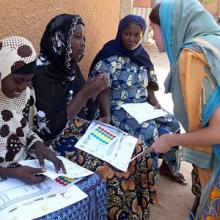For over two years, Improve Group staff has been fortunate enough to work with several of Minnesota’s Statewide Health Improvement Program (SHIP) grantees. Through SHIP, grantees in each of Minnesota’s 87 counties and several tribes were charged with making policy, systems and environmental changes in schools, communities, worksites and healthcare facilities to help reduce obesity and tobacco use in our State.
January 18, 2012 - 8:15pm
January 3, 2012 - 3:31pm
Say you are working to change something big across a large population; for example, tobacco use, or teen pregnancy rates, or recycling habits. Traditionally, programs have been designed with the idea that knowledge and attitudes lead to behavior change (see earlier post). For example, teach people about the dangers of tobacco use, help them develop new beliefs about the health risks of tobacco use, and you will see rates fall.
December 20, 2011 - 7:53pm
What does it take to be a leader in the social sector? Our recent research with two different leadership programs – the MAP Leaders’ Circle program and Rutgers Institute for Ethical Leadership showed that one of the most critical needs of leaders is time to reflect. Many cited similar benefits from reflection: self-awareness, ability to master challenges when they come, and innovation.
December 14, 2011 - 6:43pm
There was a recent flurry of activity on the Evaltalk listserv about the concept of stakeholders in evaluation, and how evaluators address stakeholder needs when planning an evaluation, and engage stakeholders in carrying out an evaluation.
November 22, 2011 - 7:09pm
 No matter how fantastic your program is, unless it is completely comprehensive (i.e., the Mars isolation experiment), other, external factors will influence how much your participants succeed.
No matter how fantastic your program is, unless it is completely comprehensive (i.e., the Mars isolation experiment), other, external factors will influence how much your participants succeed. November 22, 2011 - 7:06pm
Time
Access
Familiarity
Comfort
November 14, 2011 - 9:27am
October 31, 2011 - 9:49am
October 26, 2011 - 1:29pm
Understanding your clients’ opinions and perspectives is one of the most important parts of the evaluation process. Today, many of us take for granted the convenience and ease of using technology or paper surveys for our data collection needs. The reality is that these methods may not always be the most appropriate as organizations today serve an increasingly diverse population who may not be familiar with or be comfortable with technology or pen-and-paper methods.
What are the options?






